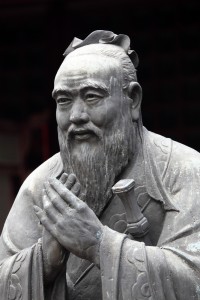The wisdom of Confucius for a lost and lonely heart
The wisdom of Confucius for a lost and lonely heart
The wisdom of Confucius for a lost and lonely heart
-
Hannah
-
Hannah
 In each of my novels I weave in a wiser, older character whose role is to guide my heroine (in part, I do so in the memory of my childhood governess, Zula, who so inspired me). In Burning Embers Coral’s yaha (nanny) Aluna filled the role – albeit her guidance was tinged with the superstitions of her native people. In The Echoes of Love, I decided to make the guide a little different.
In each of my novels I weave in a wiser, older character whose role is to guide my heroine (in part, I do so in the memory of my childhood governess, Zula, who so inspired me). In Burning Embers Coral’s yaha (nanny) Aluna filled the role – albeit her guidance was tinged with the superstitions of her native people. In The Echoes of Love, I decided to make the guide a little different.
Qiqiang Ping Lü is a frail old Chinese man who tells fortunes and gives guidance from his shop near the Ponte del Paradiso. He is a dignified, cordial, kindly man who sees in Venetia a lost soul and is most generous in giving her the benefit of his learnings as a scholar of Confucius.
I myself have read widely of the works of Confucius, and I have always found his philosophy full of wisdom. My character, Venetia, is so embroiled in a world of mirage and uncertainty that I knew a little touch of Confucian input would help set her on the right path.
Three teachings of Confucius, relayed by Ping Lü, in particular help Venetia:
- By three methods we may learn wisdom: first, by reflection, which is the noblest; second, by imitation, which is the easiest; and third by experience, which is the bitterest. For Venetia, the first and last are of most importance: she must search inside herself and be prepared to learn, to reconsider, to think; and she must also be brave enough to experience her emotions, experience being with Paolo, though in doing so she risks the experience being painful.
- To be wronged is nothing unless you continue to remember it. As Ping Lü says to Venetia, ‘Crush the rose of anger, my child, so it may only leave its delicate fragrance on your hands. Learn to forgive an evil deed so you do not remain the victim of its consequences forever.’ Venetia is holding on to the pain of a lost love – a man who abandoned her when she most needed him. But how can she move on and find love with Paolo if she is trapped in the past, lost in its echoes?
- Never does the human soul appear so strong as when it foregoes revenge and dares to forgive an injury. I find this advice most powerful and most moving. The word ‘dare’ leaps out at me. It takes courage to forgive, to let go. It is daring. It is brave. These are certainly terms I’d apply to Venetia’s character in other senses – after all, she has left her homeland, England, and forged a great career as an architect in a foreign city. But can she be this courageous when it comes to her heart?
It is amazing to think such wisdom dates back thousands of years. Confucius lived from 551–479 BC. There are so many other pearls of wisdom from the philosopher I could have included in the book; he’s perhaps the most prolific and most well-read philosopher of all time. Take the following handful out of many, many quotations as an example:
- Be not ashamed of mistakes and thus make them crimes.
- I hear and I forget. I see and I remember. I do and I understand.
- It does not matter how slowly you go so long as you do not stop.
- Our greatest glory is not in never falling, but in getting up every time we do.
- Respect yourself and others will respect you.
- Study the past if you would define the future.
- To be able under all circumstances to practice five things constitutes perfect virtue; these five things are gravity, generosity of soul, sincerity, earnestness and kindness.
- When anger rises, think of the consequences.
If you’re interested in Confucius, you’ll find all his wisdom laid out in The Analects, which is the classic tome of his philosophies. But for a more modern take (and a powerful one; this book has sold more than ten million copies!) take a look at Yu Dan’s Confucius from the Heart: Ancient Wisdom for Today’s World– a great gift for a loved one, especially yourself.
